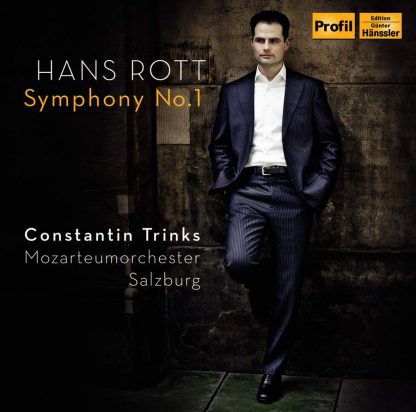Περιγραφή
Καλλιτέχνες
|
Hans Rott composed the first movement when he was 19 – two years prior to the other movements. Whereas the motif and theme of this work were treated in a truly remarkable but to some extent rather simple manner, the other movements reveal that they have been written by a more experienced composer. Besides we have to take into consideration that Rott, with regard to the composition competition of July 2, 1878, worked under time pressure – he composed the first movement in 1 1/2 months, at the most. Yet the jury members who had to judge the accepted works did not find fault with the technical value of the movement presented by Rott. They were rather irritated by distinct reminiscences of Richard Wagner; Rott’s work failed. We refrain from any analytical observations here; instead we refer to the detailed analysis (with many music samples) Litterscheid . Yet it has to be mentioned that some characteristics, typical for Mahler’s work, are clearly to be found in this Symphony, such as “bird calls” or “music from another world”.. This correspondence is best revealed by the Scherzo: It brims with stereotypes from waltzes and ländlers and anticipates in a stimulating way Mahler’s technique of exploiting such models. But this is not enough: Mahler quotes from this movement in the third movements of his Second and Fifth Symphony. In the not too distant future this shall be illustrated by audio examples; until then we refer to Banks and Kreysing/Litterscheid. How is the “value” of the Symphony to be estimated? Let us turn our attention to Gustav Mahler first: “It is completely impossible to estimate what music has lost in him. His genius soars to such heights even in his first symphony, written at the age of twenty, and which makes him – without exaggeration – the founder of the new symphony as I understand it. He, however, did not reach entirely what he wanted. It is as if someone swings back to throw as far as he can and, still clumsy, does not quite hit the goal.” (Gustav Mahler in Nathalie Bauer-Lechner’s reminiscences). Mahler is certainly right here, for the Symphony is (not yet) a mature masterpiece. Rott was no prodigy which is sometimes revealed in the lack of experience as to composition as well as to instrumentation. If he had had a chance he certainly would have revised his Symphony in later years. But another thing becomes equally obvious: Rott had not only been very ambitious, he also had an extraordinary musical imagination and he did not shrink from disregarding conventions if he considered it necessary. “Yet I know what he is aiming at. Yes, he is so related to my very own that he and I seem to me like two fruits from the same tree, brought forth by the same soil, nourished by the same air. He could have been so infinitely much to me and perhaps the two of us together would have fairly exhausted the content of this new age which was dawning for music.” (Gustav Mahler, loc. cit.) Hardly any further comment is necessary. As Banks (page 9) puts it: “One wonders what Rott could have achieved if his life had not been so tragically short.” |











